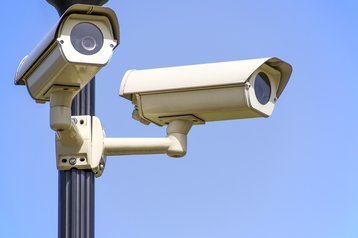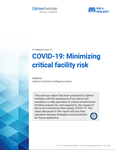As the world faces an unprecedented challenge and Covid-19 continues to cause disruption to global supply chains, commerce and our day-to-day working lives, the cloud has never been so important or so valued. Across every industry, organizations are realizing the benefits of cloud-enabled services, utilizing these scalable, flexible solutions to enable them to effectively keep the lights on. In the current climate, IT leaders have never had to trust cloud infrastructure more with the safeguarding of software, systems and data.
Yet cloud also brings physical security into the equation, particularly at this time when premises are unoccupied, assets need protecting and the movement of people regulated. Technologies such as network cameras and access control devices would, not so long ago, have existed in isolation. Now, through advances in the Internet of Things (IoT) that enable the connection of IP devices to a network, the world of physical security is benefiting from integration with cloud platforms, and the old traditional relationships with the fire and security professional are increasingly falling under the remit of IT.
Growing interest in physical security as-a-service
As many as 84 percent of IT managers are currently using or considering cloud-based video surveillance (VSaaS) or access control (ACaaS) systems, according to an independent survey recently commissioned by Morphean, published in a whitepaper, ‘Hosted Security adoption in Europe – Landscape Report’. The survey investigated the attitudes and behaviours of 1000 IT decision makers across the UK and Europe, and its findings showed an appreciation of the convergence of physical and cyber security and a willingness to embrace these systems when integrated with IT in the cloud.
We also found that 36 percent of IT managers identified operational performance as a priority for improvement within the next year. When we consider the many aspects of operational performance, productivity will always be a key measure, and cloud facilitates leaner decision-making, being more scalable and customizable to adapt to the changing business landscape as required. Both VSaaS and ACaaS use a ‘pay-as-you-go’ model which is already the preference of the IT department, removing the large scale capital expenditure often associated with traditional physical security and shifting this to the cloud as an operational expense with all the cost, space and security benefits this brings.
Benefits across security and business
With the modern IT leader being heavily involved in business decision making as well as proactive security management, the implementation of technologies that have multiple benefits for the entire business would seem to be a smart move. It’s predicted that the VSaaS market, in particular, will reach USD $5.93b by 2022, growing at a CAGR of 22 percent, in part due to the intelligent insights that connected systems can deliver to improve business operations and ensure better optimization of people and resources.
There are many ways in which these technologies can be used to both improve onsite security and refine operations, with multiple applications across many industries. For example, in the current climate, a system designed to monitor a busy retail environment to optimize customer flow and reduce incidences of aggression, could now be used to help enforce social distancing measures, protecting staff and customers with integrated access control and real-time surveillance. In a warehousing and logistics environment, remote management of surveillance cameras will enable security officers to confirm the security of a site in real time without the need to be present.
Facing the challenges and reaping the benefits
Hosted security not only provides intelligent insights that are invaluable for the management and protection of premises, assets and people, but also replace archaic on-premise legacy technologies which are both expensive to maintain and increasingly problematic to secure. Integrating seamlessly with existing IT infrastructure, Morphean’s own cloud platform utilises Tier 3 data center storage with dual powered equipment and multiple uplinks, ensuring high levels of protection of customer data.
More and more businesses are trusting in the capabilities of hosted physical security. From complex data analysis to inform business decision making, to powerful diagnostics tools and remote management to aid security teams across multiple industries and locations, physical security in the cloud represents a leap forward in ensuring that companies of any size are capable of facing the wide range of challenges we encounter in our modern age.





